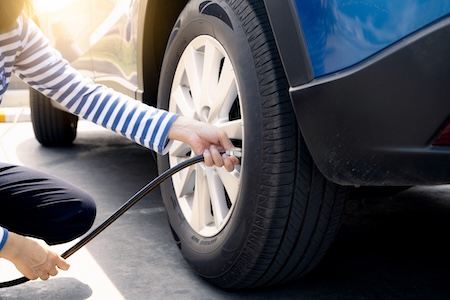Have you ever wondered why car manufacturers list a range for fuel economy? Can it really make a difference how and where you drive?
Car manufacturers will tell you they list a range for fuel economy to provide consumers with an understanding of the potential fuel efficiency their vehicle may achieve under different conditions. Many factors can influence a vehicle’s fuel economy, including driving habits, terrain, weather conditions, and traffic patterns. For instance, a car might achieve better fuel economy when driven on highways at steady speeds compared to city driving with frequent stops and starts. By providing a range rather than a single number, manufacturers aim to give consumers a more realistic expectation of what they might experience regarding fuel efficiency.
Yes, you can save on fuel economy just by paying attention to how you drive. But it’s also important to understand that your vehicle plays a part in this.
Tires Play a Significant Role in Fuel Economy
At first glance, you might be wondering how tires impact your fuel economy.
Tires may seem firm, but they are flexible as they connect with the road. Let’s talk about rolling resistance. When a tire rolls, it flexes and deforms slightly, which consumes energy. Tires designed with low rolling resistance minimize this energy loss, resulting in improved fuel efficiency. Tires with lower rolling resistance require less energy to keep them moving forward.
This is determined by the design of the tire. Tread patterns, tire compounds, and construction materials all influence how efficiently a tire moves along the road surface. Manufacturers develop tires specifically to reduce rolling resistance, enhancing fuel economy without sacrificing other important performance attributes like traction and handling.
Does tire size play an essential part in this process? You bet. Larger tires generally have higher rolling resistance compared to smaller ones. They have more surface area in contact with the road, which increases friction and energy loss. But don’t think that merely reducing your tire size will impact fuel economy. Choosing tires that are appropriately sized for the vehicle is essential to contribute to better fuel economy.
Maintenance matters as well. Regular tire maintenance, including rotation, alignment, and balancing, can also impact fuel economy. Properly maintained tires ensure even wear and optimal performance, reducing rolling resistance and maximizing fuel efficiency.
What can you do on a regular basis? Monitor tire pressure. Proper tire inflation is crucial for fuel economy. Underinflated tires increase rolling resistance, requiring more energy to move the vehicle. Overinflated tires can lead to reduced traction and uneven wear. Maintaining the recommended tire pressure specified by the vehicle manufacturer helps optimize fuel efficiency.
It really does make a difference.
One Tire Is Flat … Now What?
Have you ever been in a situation where one tire has lower pressure than the others? It’s not flat; it just doesn’t match the others. Does it matter?
In short, yes. If one tire is noticeably flatter than the others, it can have several negative impacts on fuel economy:
Remember that rolling resistance we talked about earlier? A significantly underinflated tire will have higher rolling resistance compared to properly inflated tires. As a result, the vehicle’s engine will need to work harder to overcome the increased friction between the flat tire and the road surface. This extra effort translates to higher fuel consumption and decreased fuel economy.
A flatter tire can create uneven drag, especially at higher speeds. This imbalance can cause the vehicle to pull to one side, requiring additional steering corrections to maintain a straight path. These corrections lead to increased aerodynamic drag, further reducing fuel efficiency.
Driving with one flat tire puts additional strain on the vehicle’s drivetrain components, including the engine, transmission, and differential. This strain can decrease overall mechanical efficiency, resulting in higher fuel consumption.
The more you drive on unbalanced tire pressure, the worse it gets. Continued driving on a significantly underinflated tire can cause uneven tire wear patterns, leading to premature tire wear. As the tire wears unevenly, it becomes less efficient at maintaining traction and stability, further impacting fuel economy.
All of which can lead to safety issues. Driving with a flat tire compromises vehicle handling and stability, increasing the risk of accidents or loss of control. In addition to the safety implications, sudden maneuvers to compensate for handling issues can lead to increased fuel consumption.
How to Maintain Tires and Improve Fuel Economy
Keeping a vehicle in good working condition has many benefits – that’s why you’re reading this. You understand that tire pressure has many benefits, one of them being improved fuel efficiency.
It starts with properly maintaining your tires.
While many cars today have a dashboard icon to alert you to improper tire pressure, it’s still something you should check regularly. Use a tire pressure gauge to check the pressure in all tires, including the spare, at least once a month and before long trips. Inflate tires to the recommended pressure specified by the vehicle manufacturer, which can usually be found in the owner’s manual, on a sticker inside the driver’s door, or on the inside of the fuel filler flap.
Misaligned tires can cause uneven wear and increase rolling resistance, leading to decreased fuel economy. Have your vehicle’s wheel alignment checked periodically, especially after hitting potholes or curbs, or if you notice uneven tire wear.
This also means rotating the tires. Rotating tires helps ensure even wear, extends tire life, and optimizes fuel economy. Follow the rotation pattern recommended by the vehicle manufacturer, typically every 5,000 to 7,500 miles, or as specified in the owner’s manual.
Unbalanced tires can cause vibrations and uneven wear, affecting fuel economy and ride comfort. Have your tires balanced whenever you install new tires, replace a tire, or notice vibrations while driving.
Think your tires might be worn out? Worn-out tires have reduced traction, which can impact fuel economy and safety, especially in wet or slippery conditions. Use a tread depth gauge to measure tire tread depth regularly and replace tires when the tread depth reaches 2/32 of an inch or lower.
We also recommend keeping your car clean inside and out. Clean tires regularly to remove dirt, grime, and road debris. Accumulated debris can add weight to the wheels and increase rolling resistance, reducing fuel efficiency. Overloading your vehicle can put excessive strain on tires, leading to increased wear and decreased fuel economy.
Is Your Vehicle Ready To Go?
When was the last time you checked tire pressure? If you have any further questions, we’re here to provide the answers.
Whether you’re debating on purchasing new tires, or have a problem keeping your tires properly inflated, we can help. Keeping your car running well doesn’t have to be complicated. Just a little TLC and regular maintenance will help ensure the longest life possible.


